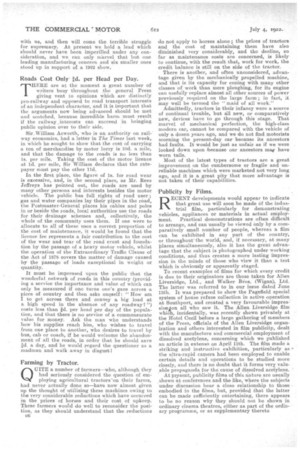Roads Cost Only Id. per Head per Day. T HERE are
Page 2

If you've noticed an error in this article please click here to report it so we can fix it.
at the moment a great number of writers busy throughout the general Press giving vent to opinions which are distinctly pro-railway and apposed to road transport interests of an independent character, and it is important that the arguments now being advanced should be met and scotched, because incredible harm must result if the railway ,interests can succeed in bringing public opinion over to their side.
Sir.William Acworth, who is an authority on railway economics, had a letter in The Times last week, in which he sought to show that the cost of carrying a ton of merchandise by motor lorry is led, a mile, and that the damage to the roads is no less than is, per mile. Taking the cost of the motor licence at id. per mile, Sir William declares that the ratepayer must pay the other lid.
In the first place, the figure of is, for road wear is excessive, and, in the second place, as Mr. Rees Jeffreys has pointed out, the roads are used by many other persons and interests besides the motor vehicle. The public has full rights of road user ; gas and water companies lay their pipes in the road, the Postmaster-General places his cables and poles in or beside the roads, local authorities use the roads for their drainage schemes and, collectively, the whole of the community uses them. If one were to allocate to all of these uses a correct proportion of the cost of maintenance, it would be found that the licence fee represents a fair contribution to the cost of the wear and tear of the road crust and foundation by the passage of a heavy motor vehicle, whilst the operation of the Extraordinary Traffic Clause of the Act of 1878 covers the matter of damage caused by the passage of loads exceptional in weight or quantity.
It must be impressed upon the public that the wonderful network of roads in this country (providing a service the importance and value of which can only be measured if one turns one's gaze across a piece of country and then asks oneself : "How am 1 to get across there and convey a big load at a high speed in the absence of any roadway? ") costs less than id. per head per day of the population, and that there is no service of a commensurate value for money. Ask the man who understands how his supplies reach him, who wishes to travel from one place to another, who desires to travel by bus, cab or coach, if he would welcome the abandonment of all the roads, in order that he should save id. a day, and he would regard the questioner as a madman and walk away in disgust I








































